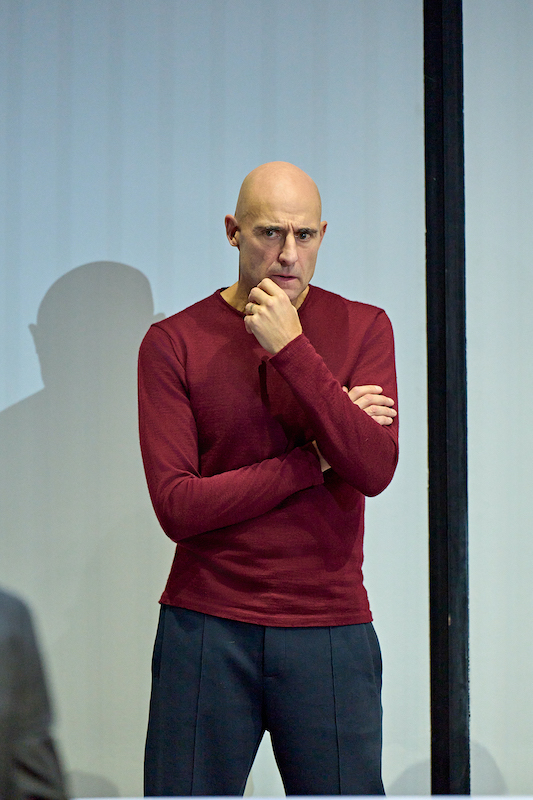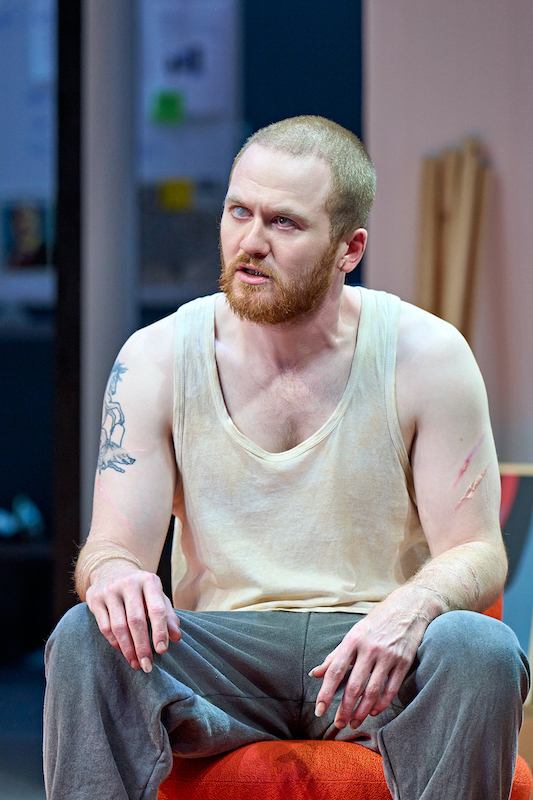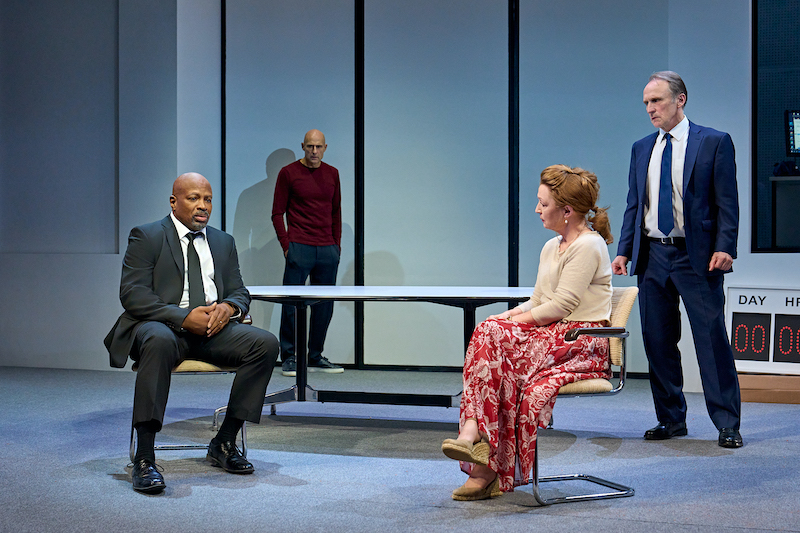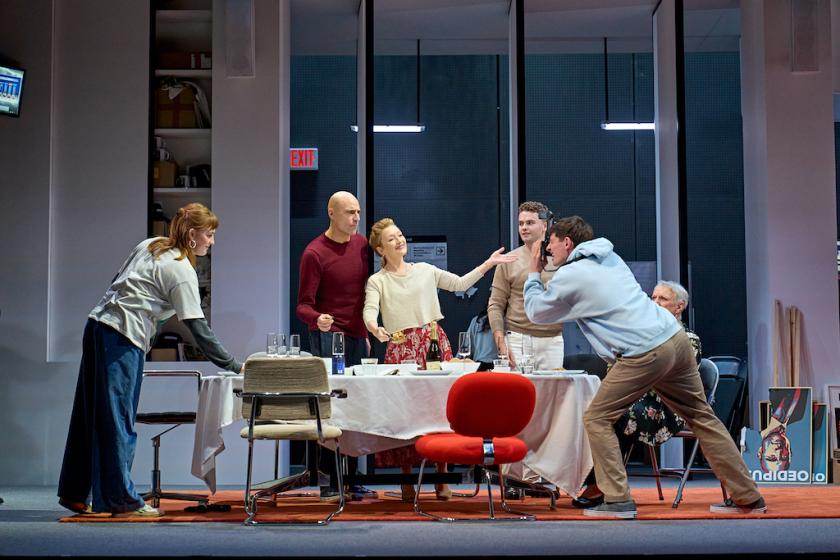How many times does a politician survive wave after wave of attack from rivals, surf the waves of fickle voters and tiptoe around every policy mishap, only to be undone by an appalling error of judgement in their private life, a skeleton in the closet, their own, flawed personality? And how many times, on the downfall of a British PM, does the television news take us back to the moment the disgraced politician stood on the steps of No 10 in their moment of victory?
With this in mind, it’s a neat touch for Robert Icke to open his adaptation of Sophocles’ tragedy Oedipus with his presumptive ruler presiding over something very like a Whitehall press event. Pre-recorded and projected onto Wyndham’s stage curtain, Oedipus (Mark Strong, pictured below) is on the street, surrounded by cameras, smugly confident, making all kinds of ill-judged promises for when he is in power. He isn’t claiming victory, yet, but the votes are being counted and he’s two hours away from a projected election landslide. As with so many Icke productions, a digital clock on the stage starts counting down: that’s two hours in real time for Oedipus’s life to come crashing down.
 Icke hatched this show in 2018, in Dutch, for Ivo van Hove’s Toneelgroep Amsterdam; it was performed a year later at the Edinburgh Festival. It now lands in English, with an impeccable cast led by the formidable duo of Mark Strong and Lesley Manville as Oedipus’s mum, now wife, Jocasta.
Icke hatched this show in 2018, in Dutch, for Ivo van Hove’s Toneelgroep Amsterdam; it was performed a year later at the Edinburgh Festival. It now lands in English, with an impeccable cast led by the formidable duo of Mark Strong and Lesley Manville as Oedipus’s mum, now wife, Jocasta.
London theatre goers will recall Icke’s scintillating, Olivier Award- winning Oresteia, for the Almeida in 2015: another Greek tragedy in which, hey, they fuck you up, your mum and dad. In truth, Oedipus doesn’t feel as conceptually bold, or visually imaginative as that adaptation, though it certainly packs a punch.
Where it doesn’t entirely convince is that contemporary political setting. Icke clearly finds connection between Oedipus’s commendable, if obsessive desire for truth-telling, with our society’s intolerance of the lack of such honesty in the political classes. But the initial flurry of recognisable elements, including the ‘birther’ controversy that plagued Barack Obama, the Tory-Lib Dem coalition, Trump-era populism, and Emmanuel Macron's creation of his own political party, all feels a bit forced. In equally unsatisfying contrast, on election night the family cocoon itself, alone, in the campaign office, undisturbed by colleagues, media, or anyone save for the fortune teller Teiresias (Samuel Brewer, pictured below right) to kick the tragedy into motion and Oedipus’s mother Merope (June Watson) to add the coup de grace; to watch characters holed up in an eerily airless room during a moment of such political import and personal triumph is a tad ridiculous.
And, on this occasion, Hildegard Bechtler’s set feels underwhelming: the television screens and placards notwithstanding, this campaign room lacks credibility; if you’re going to suggest a very particular milieu, recreate it with a bit more verve.
 The adaptation excels in the way that Icke identifies the tragedy as being not of one man, but of his entire family. In this, it bears some comparison with another new Sophocles adaptation, Alexander Zeldin’s looser take on Antigone, The Other Place, across the river at The National. Could the coexistence of these productions signal a crisis of family, as much as politics in today’s society?
The adaptation excels in the way that Icke identifies the tragedy as being not of one man, but of his entire family. In this, it bears some comparison with another new Sophocles adaptation, Alexander Zeldin’s looser take on Antigone, The Other Place, across the river at The National. Could the coexistence of these productions signal a crisis of family, as much as politics in today’s society?
Reuniting with Icke after their Simenon adaptation Red Barn, in 2018, Strong is dependably impressive as a man who is charismatic, authoritative, idealistic, but also prone to anxiety and egotism; one moment giving his children the most compassionate guidance and support, the next tearing into his brother-in-law and political advisor Creon (Michael Gould, pictured below, far right, with Gary McDonald, Strong and Manville) with withering cruelty. He also has a habit of sanctimonious speechifying that begs comeuppance.
Oedipus’s wife, feisty daughter Antigone (Phia Saban) and two sons are cut from the same cloth, alternately narcissistic, bitchy and kind. Their family dynamic is engagingly evoked, the switches from jollity and warmth to friction, and back again, expertly choreographed and played. Icke capitalises on our knowledge of their eventual fates – the two brothers will go to war with each other, the uncle will bury his niece alive – to swathe these scenes in pathos. And there is a keen understanding that their collective tragedy could be avoided were it not for Oedipus’s compulsion to dig into his past, to strive for self knowledge and, politically, purify his reputation in the public eye. The play also succeeds brilliantly as a mystery thriller, as Oedipus’s investigation into the death, many years before, of former ruler and Jocasta’s first husband, Laius, dovetails with the revelations of his own birth, leading to theatre’s most tragic double whammy. Of those involved in joining the dots, June Watson is both hilariously caustic and deeply moving as Merope, brusquely coming on stage every 10 minutes or so to demand an audience that her son is too preoccupied to give, but, inevitably, will contain the final piece of the puzzle.
The play also succeeds brilliantly as a mystery thriller, as Oedipus’s investigation into the death, many years before, of former ruler and Jocasta’s first husband, Laius, dovetails with the revelations of his own birth, leading to theatre’s most tragic double whammy. Of those involved in joining the dots, June Watson is both hilariously caustic and deeply moving as Merope, brusquely coming on stage every 10 minutes or so to demand an audience that her son is too preoccupied to give, but, inevitably, will contain the final piece of the puzzle.
All the while, Jocasta gives the increasing impression that she knows the awful truth, at least in her gut. It’s she who laments the “secrecy like bleach in the air” and begs her husband to desist from his digging. Manville is magnificent, whether disingenuously referencing her senior age to her husband’s, ironically calling him “baby” while climbing sexily all over him, or relating Laius’s horrific abuse of her, or shrivelling before our eyes as the incontrovertible truth about her current husband is revealed. The work by Manville and Strong at the end of the play is at once electrifying, and heartbreaking.















Add comment